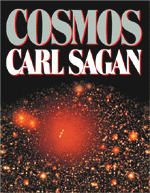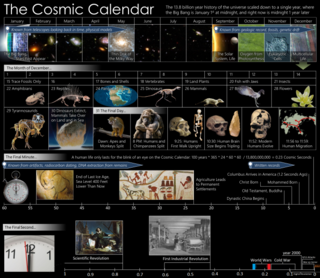
Ann Druyan is an American documentary producer and director specializing in the communication of science. She co-wrote the 1980 PBS documentary series Cosmos, hosted by Carl Sagan, whom she married in 1981. She is the creator, producer, and writer of the 2014 sequel, Cosmos: A Spacetime Odyssey and its sequel series, Cosmos: Possible Worlds, as well as the book of the same name. She directed episodes of both series.

Carl Edward Sagan was an American astronomer, planetary scientist, and science communicator. His best known scientific contribution is his research on the possibility of extraterrestrial life, including experimental demonstration of the production of amino acids from basic chemicals by exposure to light. He assembled the first physical messages sent into space, the Pioneer plaque and the Voyager Golden Record, which were universal messages that could potentially be understood by any extraterrestrial intelligence that might find them. He argued in favor of the hypothesis, which has since been accepted, that the high surface temperatures of Venus are the result of the greenhouse effect.
Nemesis is a Greek mythological spirit of divine retribution against those who succumb to hubris. Nemesis may also refer to:

Witold Marian Gombrowicz was a Polish writer and playwright. His works are characterised by deep psychological analysis, a certain sense of paradox and absurd, anti-nationalist flavor. In 1937, he published his first novel, Ferdydurke, which presented many of his usual themes: problems of immaturity and youth, creation of identity in interactions with others, and an ironic, critical examination of class roles in Polish society and culture.

Cosmos: A Personal Voyage is a thirteen-part, 1980-1981 television series written by Carl Sagan, Ann Druyan, and Steven Soter, with Sagan as presenter. It was executive-produced by Adrian Malone, produced by David Kennard, Geoffrey Haines-Stiles, and Gregory Andorfer, and directed by the producers, David Oyster, Richard Wells, Tom Weidlinger, and others. It covers a wide range of scientific subjects, including the origin of life and a perspective of our place in the universe. Owing to its bestselling companion book and soundtrack album using the title, Cosmos, the series is widely known by this title, with the subtitle omitted from home video packaging. The subtitle began to be used more frequently in the 2010s to differentiate it from the sequel series that followed.
Black Star or Blackstar may refer to:

Catherine Ann Asaro is an American science fiction and fantasy author, singer and teacher. She is best known for her books about the Ruby Dynasty, called the Saga of the Skolian Empire.
Exile is either an entity who is, or the state of being, away from one's home while being explicitly refused permission to return.
Avatar is a concept in Hinduism representing a material manifestation of a deity.

Brannon Braga is an American television producer, director and screenwriter. Best known for his work in the Star Trek franchise, Braga was a key creative force behind three of the franchise's live action series. He later became an executive producer and writer on several Fox shows including 24, Terra Nova, and The Orville. His film credits include Mission: Impossible 2, Star Trek Generations and Star Trek: First Contact.
An icon, from the Greek word for image, is a religious painting in the tradition of Christianity.

Neil deGrasse Tyson is an American astrophysicist, author, and science communicator.

Cosmos is a popular science book written by astronomer and Pulitzer Prize-winning author Carl Sagan. It was published in 1980 as a companion piece to the PBS mini-series Cosmos: A Personal Voyage with which it was co-developed and intended to complement. Each of the book's 13 illustrated chapters corresponds to one of the 13 episodes of the television series. Just a few of the ideas explored in Cosmos include the history and mutual development of science and civilization, the nature of the Universe, human and robotic space exploration, the inner workings of the cell and the DNA that controls it, and the dangers and future implications of nuclear war. One of Sagan's main purposes for both the book and the television series was to explain complex scientific ideas in a way that anyone interested in learning can understand. Sagan also believed the television was one of the greatest teaching tools ever invented, so he wished to capitalize on his chance to educate the world. Spurred in part by the popularity of the TV series, Cosmos spent 50 weeks on the Publishers Weekly best-sellers list and 70 weeks on the New York Times Best Seller list to become the best-selling science book ever published at the time. In 1981, it received the Hugo Award for Best Non-Fiction Book. The unprecedented success of Cosmos ushered in a dramatic increase in visibility for science-themed literature. The success of the book also served to jumpstart Sagan's literary career. The sequel to Cosmos is Pale Blue Dot: A Vision of the Human Future in Space (1994).
Steven Soter is an astrophysicist currently holding the positions of scientist-in-residence for New York University's Environmental Studies Program and of Research Associate for the Department of Astrophysics at the American Museum of Natural History. He is a proponent of the International Astronomical Union's definition of planet.

The Cosmic Calendar is a method to visualize the chronology of the universe, scaling its currently understood age of 13.8 billion years to a single year in order to help intuit it for pedagogical purposes in science education or popular science.
The Immortals may refer to:

The Symphony of Science is a music project created by Washington-based electronic musician John D. Boswell. The project seeks to "spread scientific knowledge and philosophy through musical remixes." Boswell uses pitch-corrected audio and video samples from television programs featuring popular educators and scientists. The audio and video clips are mixed into digital mashups and scored with Boswell's original compositions. Two of Boswell's music videos, "A Glorious Dawn" and "We are All Connected", feature appearances from Carl Sagan, Richard Feynman, Neil deGrasse Tyson, Bill Nye, and Stephen Hawking. The audio and video is sampled from popular science television shows including Cosmos, The Universe, The Eyes of Nye, The Elegant Universe, and Stephen Hawking's Universe.

Cosmos: A Spacetime Odyssey is a 2014 American science documentary television series. The show is a follow-up to the 1980 television series Cosmos: A Personal Voyage, which was presented by Carl Sagan on the Public Broadcasting Service and is considered a milestone for scientific documentaries. This series was developed to bring back the foundation of science to network television at the height of other scientific-based television series and films. The show is presented by astrophysicist Neil deGrasse Tyson, who, as a young high school student, was inspired by Sagan. Among the executive producers are Seth MacFarlane, whose financial investment was instrumental in bringing the show to broadcast television, and Ann Druyan, a co-author and co-creator of the original television series and Sagan's wife. The show is produced by Brannon Braga, and Alan Silvestri composed the score.
"Standing Up in the Milky Way" is the first aired episode of the American documentary television series Cosmos: A Spacetime Odyssey. It premiered on March 9, 2014, simultaneously on various Fox television networks, including National Geographic Channel, FX, Fox Life, and others. The episode is presented by the series host astrophysicist Neil deGrasse Tyson, directed by Brannon Braga, produced by Livia Hanich and Steven Holtzman, and written by Ann Druyan and Steven Soter.

Cosmos: Possible Worlds is a 2020 American science documentary television series that premiered on March 9, 2020, on National Geographic. The series is a follow-up to the 2014 television series Cosmos: A Spacetime Odyssey, which followed the original Cosmos: A Personal Voyage series presented by Carl Sagan on PBS in 1980. The series is presented by astrophysicist Neil deGrasse Tyson, written, directed, and executive-produced by Ann Druyan and Brannon Braga, with other executive producers being Seth MacFarlane and Jason Clark.











